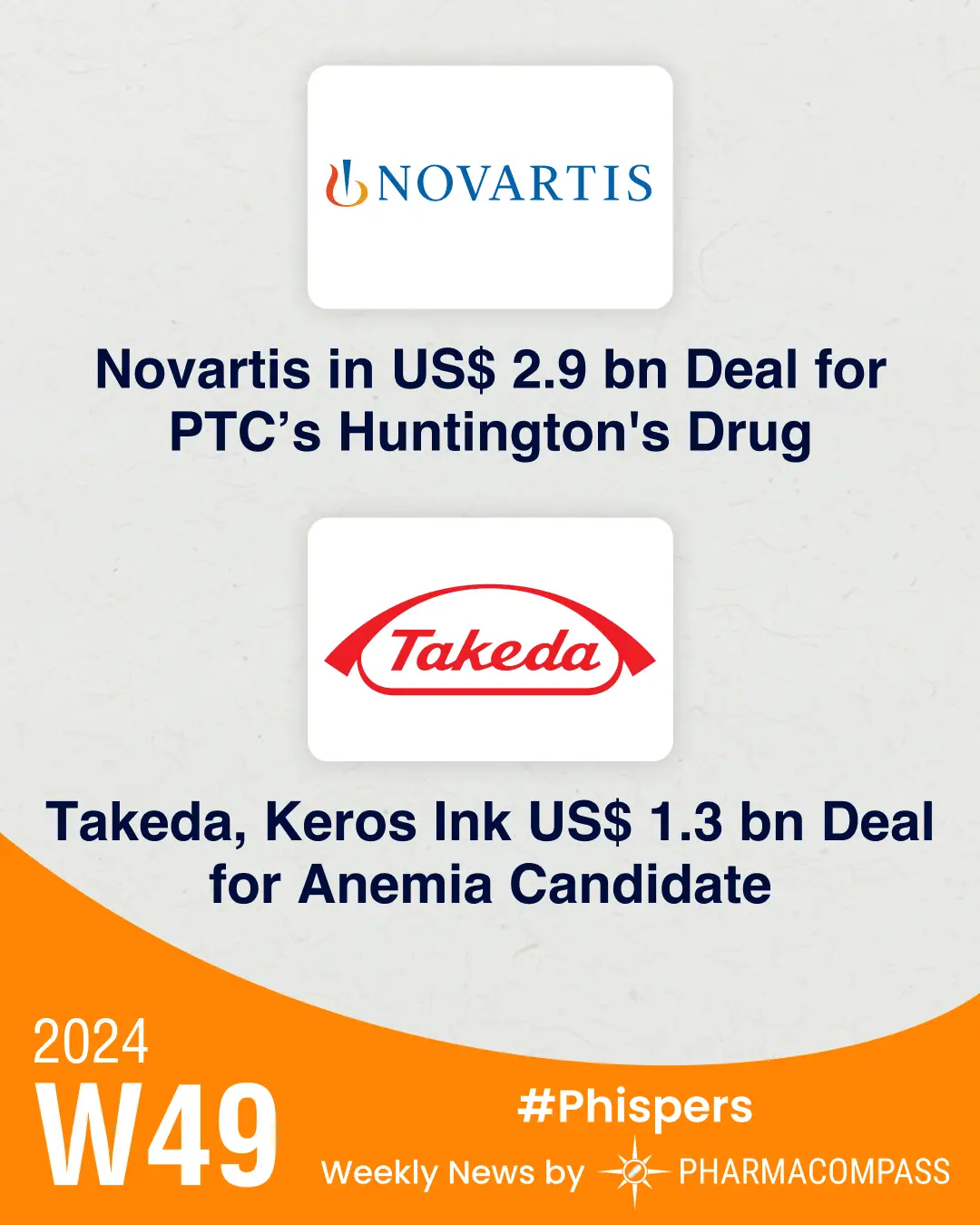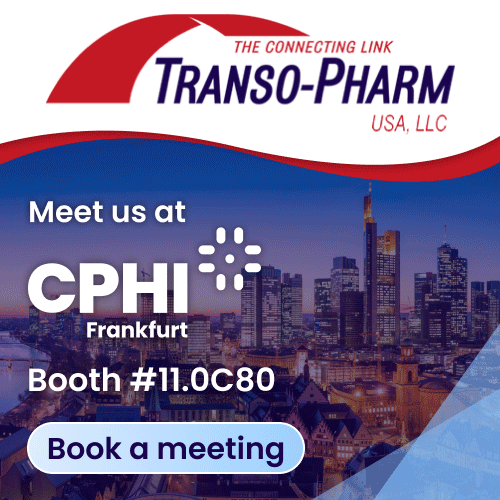
By PharmaCompass
2024-12-05
Impressions: 1,050 (Article) || 33 (Video)
In Phispers this week, we bring you news of how political changes in the US could impact the pharma industry. Big Pharma has reportedly begun lobbying with Trump for an ease in Medicare price negotiations put in place by the Biden-Harris administration. And the former chief of the US Food and Drug Administration (FDA) Scott Gottlieb has raised serious concerns over the nomination of Robert F. Kennedy Jr as the Secretary of the Health and Human Services (HHS).
After forging three deals last month, Novartis has signed a US$ 2.9 billion deal this week with PTC Therapeutics to license its Huntington’s disease program. Takeda has partnered Keros Therapeutics, promising it up to US$ 1.3 billion for a candidate that targets anemia in hematologic cancers.
GSK has entered into a deal with Chinese biotech Duality Biologics to obtain a license to develop and commercialize its preclinical molecule that targets gastrointestinal (GI) cancer. Sanofi has announced its largest investment in China by committing US$ 1.05 billion to set up a new insulin facility in Beijing. And Roche’s Genentech has entered into a potential US$ 940 million deal with COUR Pharmaceuticals to address an undisclosed autoimmune disease.
In drug approvals, FDA has okayed AstraZeneca’s blockbuster drug Imfinzi to treat adults with limited-stage small cell lung cancer. The agency has also approved Merus’ Bizengri for hard to treat cancers.
And, after rejecting its drug last week, FDA has issued a warning letter to Applied Therapeutics for deleting critical electronic data, and for making a dosing mistake in its clinical trial.
Novartis licenses PTC’s Huntington’s disease program for up to US$ 2.9 bn
Novartis is paying US$ 1 billion upfront to PTC Therapeutics and an additional US$ 1.9 billion for its PTC518 Huntington’s disease program. PTC518 is an innovative oral therapy designed to reduce the production of the mutant huntingtin protein, the root cause of Huntington’s disease. PTC said the deal was signed after “a highly competitive process with several parties involved.” Additionally, PTC will be entitled to a 40 percent share of US profits.
Takeda in potential US$ 1.3 bn deal with Keros: Takeda has licensed Keros Therapeutics’ elritercept, a late-stage activin inhibitor designed to treat anemia associated with hematologic cancers such as myelodysplastic syndromes (MDS) and myelofibrosis (MF). The deal includes a US$ 200 million upfront payment to Keros, with potential milestone payments that could exceed US$ 1.1 billion. Elritercept has shown promising results in early clinical trials, demonstrating significant reductions in transfusion dependence and improvements in anemia symptoms for patients with MDS and MF.
Big Pharma lobbying Trump to ease Medicare price negotiations, says Reuters
The US pharmaceutical industry is lobbying the incoming Trump administration to revise the Inflation Reduction Act (IRA), which allows Medicare to negotiate prices for its costliest prescription drugs. Industry executives and lobbyists told Reuters, Big Pharma is pushing to delay the timeline for when medications become eligible for price negotiations by four years for small molecule drugs, which are primarily pills.
According to analysts at S&P Global, Trump has “significant ability to potentially influence US healthcare”. They have highlighted several areas of concern, including developments related to the Affordable Care Act and the fact that Trump has threatened to roll back parts of the IRA.
Gottlieb raises concerns over RFK Jr’s nomination to head HHS: Scott Gottlieb, an industry-favored FDA commissioner who served during Trump’s first term, has raised serious concerns about President-elect Donald Trump’s nomination of Robert F. Kennedy Jr. as Secretary of HHS. Gottlieb warned that Kennedy’s long-standing vaccine skepticism could lead to a significant decline in vaccination rates for diseases like measles, mumps, and rubella, potentially resulting in large outbreaks and preventable deaths. “I think if RFK follows through on his intentions, and I believe he will, and I believe he can, it will cost lives in this country,” said Gottlieb.
FDA okays Astra’s Imfinzi for limited stage small cell lung cancer
FDA has okayed AstraZeneca’s blockbuster drug Imfinzi (durvalumab) to treat adults with limited-stage small cell lung cancer whose disease has not progressed following concurrent platinum-based chemotherapy and radiation therapy. Imfinzi is a human monoclonal antibody and an alternative to chemotherapy. It blocks a tumor’s ability to evade and dampen the immune system, and boosts the body’s anti-cancer immune response.
Merus’ therapy okayed: FDA has approved Merus NV’s therapy — Bizengri — that targets the NRG1 gene. The gene is associated with the formation and progression of several tumors. Bizengri (zenocutuzumab-zbco) is the first and only treatment indicated for adults with pancreatic adenocarcinoma or non–small cell lung cancer that are advanced, unresectable or metastatic and harbor NRG1 gene fusion. These cancers are hard to treat.
Sanofi announces US$ 1 bn investment in China for new insulin production facility
Sanofi has announced its largest investment in China, committing € 1 billion (US$ 1.05 billion) to establish a new insulin production facility in the Beijing Economic and Technological Development Zone. This new site will be Sanofi’s fourth production facility in China and is designed to enhance local end-to-end insulin production capabilities.
GSK inks deal with DualityBio: Shanghai-headquartered clinical-stage biotech Duality Biologics has entered into an exclusive option agreement with GSK for its antibody-drug conjugate (ADC) candidate, DB-1324. Under the agreement, DualityBio will grant GSK an exclusive option to obtain a license to develop and commercialize DB-1324 worldwide (excluding mainland China, Hong Kong, and Macau). DB-1324 is a molecule in preclinical development that targets gastrointestinal (GI) cancer.
Genentech-COUR in autoimmune deal: Roche’s Genentech has entered into a strategic collaboration with COUR Pharmaceuticals to develop
and commercialize the latter’s proprietary tolerogenic nanoparticle treatments for an
undisclosed autoimmune disease. The deal
includes US$ 40 million in upfront payments, with the potential of milestone payments that could exceed US$ 900 million.
After rejecting drug, FDA issues warning letter to Applied Therapeutics
Applied Therapeutics has received a warning letter from the FDA regarding its clinical trial for the genetic disease drug, govorestat. The FDA cited issues with the company’s trial conduct, including the deletion of critical electronic data, which compromised the integrity of the study. The letter highlighted a dosing mistake where at least 19 patients were given a lower dose of the drug than what was specified in the protocol. This warning comes shortly after the FDA declined to approve govorestat for treating galactosemia, a rare metabolic disorder where galactose found in milk builds up in tissues and blood.
The PharmaCompass Newsletter – Sign Up, Stay Ahead
Feedback, help us to improve. Click here
Image Credit : Phisper Infographic by PharmaCompass license under CC BY 2.0
“ The article is based on the information available in public and which the author believes to be true. The author is not disseminating any information, which the author believes or knows, is confidential or in conflict with the privacy of any person. The views expressed or information supplied through this article is mere opinion and observation of the author. The author does not intend to defame, insult or, cause loss or damage to anyone, in any manner, through this article.”








